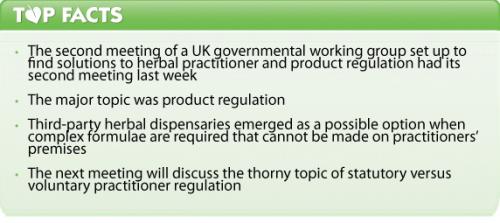Adam Smith Science & communications officer, ANH-Intl; member and special advisor, Association of Master Herbalists; member of UK Herbal Medicines and Practitioners Working Group (HMPWG)
The end of ‘sell through’ of herbal products the UK medicines regulator considers unlicensed herbal medicines threatens many formulations relied upon by UK herbal practitioners. We report on the second meeting of the UK government-convened Herbal Medicines and Practitioners Working Group (HMPWG), set up to find solutions to this and other problems faced by the UK herbal community.

The story so far
In short: the UK government convened the Herbal Medicines and Practitioners Working Group (HMPWG) earlier this year. Its remit is to find solutions to the thorny problems raised by a clash between European Union (EU) law, in the form of the Traditional Herbal Medicinal Products Directive (THMPD; Directive 2004/24/EC), and the practice of herbal medicine under UK law. The first HMPWG meeting in February 2014 set the scene and explained why the government could not proceed with its plan, announced 3 years earlier, to grant herbal practitioners ‘authorized health-care professional’ status under Article 5.1 of EU medicines law (Directive 2001/83/EC) via statutory regulation (SR).
Products not practitioners
The second HMPWG meeting, which took place last Thursday, 1st May 2014, discussed the options for effective and realistic regulation of herbal products, as opposed to practitioners. Presently, UK practitioners of non-Western herbal medicinal traditions, most notably Indian Ayurveda and traditional Chinese medicine, are disproportionately affected by the THMPD. They rely heavily on complex, polyherbal, manufactured products, unlike Western herbalists whose practice consists mainly of individualised remedies made up onsite following a one-to-one consultation. Unfortunately, it is precisely these products that are illegal under the THMPD unless they can gain a product license, or Traditional Herbal Registration (THR), under the THMPD’s clearly unsuitable licensing regime.
Added urgency was brought to the discussions by the end of the MHRA’s ‘sell-through’ period for unlicensed herbal medicines a mere 24 hours prior to the meeting. So incensed is one HMPWG member, the Association of Traditional Chinese Medicine and Acupuncture (ATCM), over this development that it has launched a legal challenge. It’s easy to see why: the end of sell-through will undoubtedly see the MHRA train its sights on a wider range of products vital to TCM practice, and has occurred before the group set up to find solutions has even submitted a report on the matter.
Dispensing for traditions?
One potential solution that was discussed at length was the introduction of herbal dispensaries into UK practice. Attendant staff members of the UK medicines regulator, the Medicines and Healthcare products Regulatory Agency (MHRA), confirmed that herbal dispensaries are presently illegal under UK law. Changing UK legislation to permit third-party herbal dispensing to some degree might offer at least a partial solution, such as when complex prescriptions are required that would be difficult for practitioners to formulate in their home dispensaries. HMPWG attendees liked the idea, but pointed out that, as ever, the devil is in the detail: it would be vital to ensure that herbalists maintained their prescribing rights under any new or revised legislation, currently protected by Regulation 3(6) of the 2012 Human Medicines Regulations. No-one at the meeting appeared to want a system of magistral prescriptions for herbal medicine, as exists in much of continental Europe.
If herbal dispensaries become a reality in the UK, they would be required to achieve Good Manufacturing Process (GMP) certification. Some attendees were also strongly in favour of certification and auditing of source materials and manufacturing facilities, regardless of location, although whether this concern was driven by commercial or professional motives is, as yet, unclear.
A role for botanical food supplements
Since one aim of the meeting was to explore routes to market for herbal products, the option of botanical food supplements was inevitably raised. Surprisingly, however, the HMPWG attendees were at best lukewarm over the idea. One attendee mentioned the legal difficulty that, according to the Food Supplements Directive (Directive 2002/46/EC), “The labelling, presentation and advertising must not attribute to food supplements the property of preventing, treating or curing a human disease, or refer to such properties.” But, since the European Court of Justice (ECJ) has repeatedly affirmed the existence of a dual route to market for herbal products – via the THMPD and as food supplements – botanical food supplements must be explored thoroughly by the HMPWG. After some discussion and my own intervention, it was added as an agenda point for a future meeting.
Warning: ‘Robust discussions’ ahead!
Of course, the HMPWG’s product-related discussions were only a prelude to the big event at the next meeting: the highly charged issue of SR versus a form of voluntary regulation for herbal practitioners. This is a highly complex debate where the positions are passionate and even entrenched, particularly on the pro-SR side. At this stage, it’s impossible to predict with any certainty how the debate will go, although my feeling is that the government has lost much of its enthusiasm for SR.
One reason for my hunch is the difficulties inherent in setting up a system of SR. As outlined by the HMPWG’s representative of the Health & Care Professions Council (HCPC), who would administer the SR scheme, the process would be complex and time consuming – and, crucially, dependent upon consistency both of consensus among those being regulated and government enthusiasm for the project. This seems somewhat unlikely given the history of herbal medicine and SR in the UK.
Outlook: Positive
All in all, then, the outcome of the second HMPWG meeting was broadly positive. Third-party herbal dispensaries may offer the hope of a workable solution to herbal product supply, although we await with interest the results of discussions on the legal implications between the meeting Chair and the MHRA. That botanical food supplements are firmly on the agenda can only be a positive thing. But it’s the next meeting that will be crucial to maintaining herbal medicine as a viable and thriving profession in the UK – and here, we’re cautiously optimistic.








Comments
your voice counts
11 May 2014 at 12:58 pm
I was one of the members on the working group committee met on April 17.
I was appalled that the intimated proposal to offer a way to maintain the availability of manufactured products was not embraced by the EHTPA affiliated members present. Their objection was that such a proposal would undermine their campaign for SR, thus putting their professional advancement before the interests of not only the public, but also before those of all the traditions excluded from the public consultation document and therefore never considered for inclusion in any regime intended for the failed attempt to gain derogation under THMPD.
Government White Paper “Enabling Excellence Autonomy and Accountability for Healthcare Workers, Social Workers and Social Care Workers”
Page 18
4.12 The extension of statutory regulation to currently unregulated professional or occupational groups, such as some groups in the healthcare science workforce, will only be considered where there is a compelling case on the basis of a public safety risk and where assured voluntary registers are not considered sufficient to manage this risk.
4.13 The exception to this is practitioners of herbal medicine, including Chinese herbal medicine. Under European law, manufactured medicines placed on the market require a suitable product licence, and from April 2011 this also applies to manufactured herbal medicines. However, Member States have the power to operate national arrangements permitting appropriately authorised healthcare professionals to commission an unlicensed medicine to meet a patient's special needs and the UK already does so for doctors and certain other appropriately regulated prescribers. While there is evidence of public health risk where unlicensed herbal medicines are supplied by unskilled practitioners, the impact on practitioners and on consumer choice of preventing the supply of all such herbal medicines would be disproportionate. We therefore propose to introduce regulation for these practitioners by the HPC, to ensure that the public are able to access these products if they should choose to do so and to provide improved assurance of the competence of practitioners. The focus of regulation will be solely on minimising risk to the public.
Apart from confirming that herbal medicine does not pose any substantiated risk to the public to justify this level of regulation, it also clearly exposes that the sole purpose and alleged justification for SR was the implementation of the THMPD derogation. This has now been declared illegal by the EU and the case for this unwarranted intrusion has therefore been disproved.
Fortunately, the government is now considering an alternative way of licensing products under “national competence” rules (see Review of the Balance of Competences between the United Kingdom and the European Union Health).
In addition to this, the ANH has been preparing an EU challenge to the legality of THMPD. I have personally contributed money to the fund to pay for this.
Unfortunately, some parties have sort to oppose the government’ approach to resolving the problem of continuing access to herbal medicine manufactured products for those whom use them, on the grounds that this would obviate their case for an already failed agenda. Some might question the morality of this stance.
I am quite frankly confused why the ANH is now complaining about the failure of an attempt to undermine its own proposal to challenge THMPD.
Robert Scott
Your voice counts
We welcome your comments and are very interested in your point of view, but we ask that you keep them relevant to the article, that they be civil and without commercial links. All comments are moderated prior to being published. We reserve the right to edit or not publish comments that we consider abusive or offensive.
There is extra content here from a third party provider. You will be unable to see this content unless you agree to allow Content Cookies. Cookie Preferences